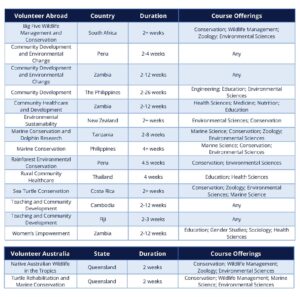The Changing Face of Volunteering to Work Integrated Learning (WIL)
In recent years, there has been a significant paradigm shift in the way Australian academics view and approach experiential service learning. Traditional volunteer programs, once considered an adventure students undertake in their summer holidays, are gradually making way for more structured and comprehensive Work-Integrated Learning (WIL) volunteer initiatives. This changing face of educational engagement reflects a deeper commitment to preparing students for the demands of the professional world.
The Traditional Volunteer Program Model
Historically, volunteer programs have offered students hands-on experiences and a chance to participate in community-based projects, contributing to personal growth and a sense of social responsibility.
However, institutions have been understandably cautious about integrating these programs into their academic curriculum. Concerns stem from the absence of clear structure and oversight of student activities, as well as ethical considerations regarding the potential impact on local communities.
This has prompted a reevaluation within academic circles, sparking reflections from both students and academics that a strategic and integrative approach is imperative to bridge the gap between theoretical knowledge from the classroom and engagement in real-world contexts. This evolving perspective underscores the necessity for structured, well-vetted, and academically accredited volunteer programs, ensuring students make meaningful contributions to communities while developing a comprehensive and ethical understanding of their role in community engagement. This transformative shift signifies a move from traditional volunteering model to Work-Integrated Learning (WIL) volunteering, intending to bring a more sophisticated and intentional approach to historical hands-on, community-based programs.
The Work-Integrated Learning Model
The benefits of Work-Integrated Learning (WIL) volunteering over traditional volunteer programs are extensive. WIL offers students a structured and vetted environment fostering an immersive learning experience that enhances critical thinking, problem-solving, and inter-cultural communication skills – qualities highly sought after by employers. The inclusion of Work-Integrated Learning (WIL) tackles logistical concerns related to traditional volunteering by prioritizing trusted partnerships, ethical and positive impacts on communities, and ensuring student safety.
The Future of WIL volunteer
As Australian academics continue to embrace the shift towards WIL, the future of experiential learning looks promising. The evolving landscape calls for innovative approaches that combine academic excellence with real-world applicability. Our commitment to this transition is to ensure each of our WIL volunteer programs are ethical, sustainable and align with the requirements of University Work Integrated Learning (WIL) in order for students to receive credit towards their degree for these programs. This transition not only enhances the quality of programs, but creates more opportunities for students.
CISaustralia provides a comprehensive catalog of 17 different WIL volunteer programs, 15 international and 2 domestic.

Related Videos: UON Podcast with CISaustralia’s Brad Dorahy
Related Videos: CISaustralia Experiential Service Learning vs. Voluntourism
